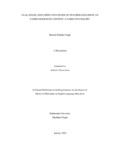
Please use this identifier to cite or link to this item:
https://hdl.handle.net/20.500.14301/351| Title: | “Challenges and Coping Strategies of Teaching English in an Under-Resourced Context: A Narrative Inquiry”. APPROVED B |
| Authors: | Singh, Ramesh Bahadur |
| Citation: | Singh,R.B.(2024),Challenges and coping strategies of teaching English in an Under-Resourced Context: a narrative inquiry |
| Issue Date: | Jan-2024 |
| Publisher: | Kathmandu University School of Education |
| School: | SOED |
| Department: | DOLE |
| Level: | M.Phil. |
| Program: | Master of Philosophy (MPhil) in English Language Education |
| Abstract: | The study explores challenges and coping strategies of English teachers in an under-resourced context. It investigates the existing situation for effective English teaching in rural public secondary schools. The study follows an interpretive research paradigm with narrative inquiry. The study area of the study was two public schools in Dadeldhura district of Nepal. The data was collected using the in-depth interview guideline with open-ended questions. After data collection, the data was analyzed and presented thematically to meet the objectives of the study. The study reveals significant challenges faced by English language teachers in under-resourced rural schools in Nepal. These challenges encompass various facets, including the limited availability of adequate technological resources, which obstruct effective language instruction and classroom engagement. Additionally, the scarcity of teaching materials hampers the delivery of comprehensive lessons, and the prevailing low English language proficiency among students inhibits the implementation of student-centered learning strategies. Overcrowded classrooms compound these issues, making classroom management and personalized attention a formidable task. Despite the obstacles, the study highlights several coping strategies employed by these dedicated teachers. Notable among these strategies include a strong focus on vocabulary development, involving the introduction of new words and ensuring students comprehend their meanings through regular practice to enhance language skills. In the absence of sufficient teaching materials, educators utilize innovative iii approaches, such as personal devices like phones and laptops, as alternative audio visual aids, proving effective in supplementing instruction. Moreover, alternative teaching methods, including group discussions and project work, are implemented to maintain student engagement, even within overcrowded classrooms. Hence, the study underscores the need for targeted interventions to address weak language skills, enhance practice and interest in English, align the curriculum with students' proficiency levels, provide adequate teaching resources, address overcrowding issues, emphasize vocabulary enhancement, and foster motivation and inspiration among students. Implementing strategies to bolster teacher training, resource allocation, and classroom management can contribute to a more conducive learning environment. The efforts made by teachers such as include targeted interventions, support systems, or educational approaches, can be effective to empower students, enabling them to enhance their language skills and reach their academic potential. |
| URI: | https://hdl.handle.net/20.500.14301/351 |
| Appears in Collections: | Dissertation |
Files in This Item:
| File | Description | Size | Format | |
|---|---|---|---|---|
| Ramesh B Singh_final (1).pdf | 906.35 kB | Adobe PDF |  View/Open |
Items in DSpace are protected by copyright, with all rights reserved, unless otherwise indicated.